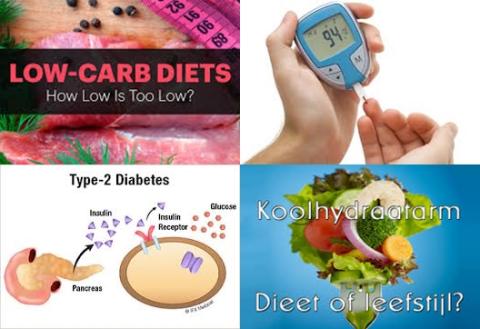
Objectives:
Nutrition therapy is an integral part of self-management education in patients with type 2 diabetes. Carbohydrates with a low glycemic index are recommended, but the ideal amount of carbohydrate in the diet is unclear. Therefore, this meta-analysis (systematic review) has been conducted.
Has carbohydrate restriction (below 45 En% carbohydrate) beneficial effects on glycemic control in type 2 diabetes?
Study design:
This review article included 10 RCTs. In total, 1,376 subjects with type 2 diabetes were included in this analysis. Forty-nine percent were male and the average age was 58 years. The majority were obese; mean BMI ranged from 26 kg/m2 in an Asian population to 37 kg/m2 in an American population.
The duration of the intervention varied from 3 to 24 months.
The average predefined targets for the assigned carbohydrate restriction were 25 En% (range 14-40 En%). The average reported intake was 30 En% (range 14-45 En%) after 3 or 6 months of intervention and 38 En% (range 27-45 En%) at 1 year (5 trials).
Results and conclusions:
The investigators found following a carbohydrate diet of 30 En% (range 14-45 En%) during 3 to 6 months significantly reduced HbA1c level of patients with type 2 diabetes with 0.34% [95% CI = 0.06 to 0.63] compared with a diet of 45-60 En% carbohydrate (high-carbohydrate diet).
Owing to heterogeneity, however, the quality of the evidence for this is only moderate. However, at 1 year or later, HbA1c level (seven trials included) was similar in the two groups.
The investigators found the greater the carbohydrate restriction, the greater the glucose-lowering effect [R = -0.85, p 0.01].
The investigators found the effect of the 2 types of diet on BMI/body weight, LDL cholesterol, QoL and attrition rate was similar throughout interventions.
The investigators concluded that carbohydrate restriction (below 45 En% carbohydrate) has a greater effect on glycemic control in type 2 diabetes than an high-carbohydrate diet in the short term. The magnitude of the effect was correlated to the carbohydrate intake, the greater the restriction, the greater glucose lowering, a relationship that has not been demonstrated earlier. However, in the long term, the glucose-lowering effect of high-carbohydrate diet (HCD) and low-carbohydrate diets (LCD) was similar.
Original title:
Systematic review and meta-analysis of dietary carbohydrate restriction in patients with type 2 diabetes by Snorgaard O, Poulsen GM, [...], Astrup A.
Link:
https://www.ncbi.nlm.nih.gov/pmc/articles/PMC5337734/
Additional information of El Mondo:
Find more information/studies on carbohydrates and diabetes right here.